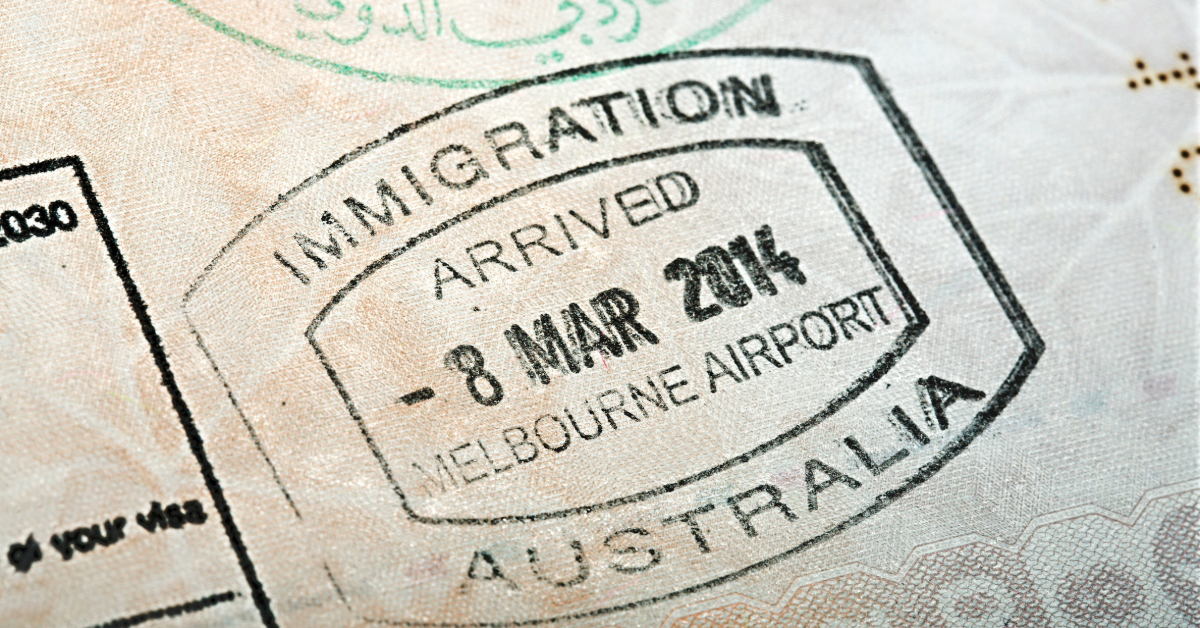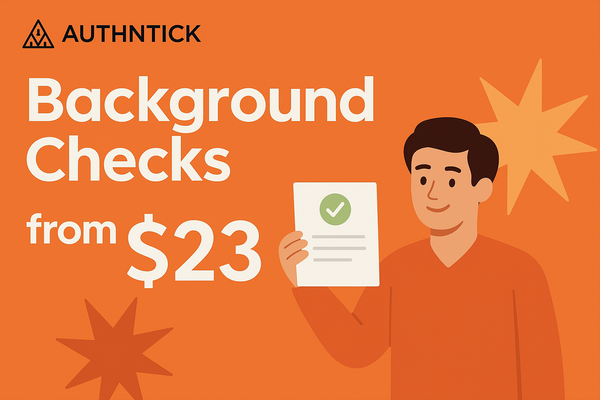Everything You Need to Know About AFP Police Check
Learn all about AFP Police Certificates for immigration—what they are, why they’re required, how to apply, and how AuthNTick makes the process fast, easy, and compliant for applicants in Australia

If you are applying for a visa, citizenship, or permanent residency in Australia, you may be required to provide an AFP Police Certificate as part of your application. This document, issued by the Australian Federal Police (AFP), verifies whether you have any disclosable criminal history in Australia.
What Is an AFP Police Check?
An AFP police check for immigration is a certified national background screening that details any criminal records an individual may have across Australia’s states and territories. It is frequently required for visa processing, employment in high-trust positions, and certain legal matters.

AFP Police Check
Required for immigration, citizenship, visas, general purpose standard and valid for work in the ACT
Why you needs AFP police check?
You may need to apply for an NPC for various legal, employment, or immigration-related reasons, including the following:
A federal criminal background check is essential for:
Residency Requirements – If you reside in the Australian Capital Territory (ACT), Jervis Bay Territory, or other external Commonwealth territories, an NPC may be required for legal or administrative purposes.
Employment with the Commonwealth Government – Many government agencies require a police check before hiring employees, mainly for security, finance, or public trust roles.
Compliance with Commonwealth Legislation – Certain professions, such as healthcare, finance, or childcare, may require a police check to meet regulatory and licensing standards.
Australian Immigration Purposes – The Australian Government may require an NPC as part of the background verification process if you apply for citizenship, permanent residency, or certain visas.
Overseas Residency or Employment – Some foreign governments or employers require an Australian police check as part of their background screening process before granting work permits or residency visas.
Visa Applications for Overseas Travel – Some countries may require an Australian NPC when applying for a visa, particularly for long-term stays, work permits, or study programs.
Overseas Adoption – If you plan to adopt a child from another country, you may need to provide an NPC to comply with international adoption laws and demonstrate your suitability as a guardian.
Why I need AFP Police Check?
A federal criminal background check is essential for:
a) Individuals applying for Australian visas, including partner and employer-sponsored visas.
b) Those seeking Australian citizenship or permanent residency.
c) Employment in sectors requiring high security clearance, such as government roles.
d) Individuals involved in legal name changes or adoption processes.
How to Apply for an Australian Federal Police Clearance
To obtain an Australian Federal Police clearance, follow these steps:
a) Visit the AuthNTick Website – Access the official AFP service provider website and complete the National Police Check application.
b) Provide Identification – You must submit valid identification documents, such as a passport or driver’s license.
c) Select the Correct Code – For immigration purposes, use Code 33 to ensure your certificate meets the Department of Home Affairs requirements.
d) Pay the Fee – Submit the required payment to process your request.
e) Receive Your Certificate – Processing times vary, but most applicants receive their certificates within 7 to 15 business days.
What does an AFP Police Check show
An AFP (Australian Federal Police) police check, or a National Police Certificate, summarises your criminal history in Australia. Specifically, it shows:
a) Disclosable court outcomes from all Australian states and territories, including any charge proven in court, court details, date, and penalty or sentence.
b) Findings of guilt by a court, even if no conviction was recorded.
c) Court convictions, even if no sentence or penalty was given.
d) Good behaviour bonds and similar court orders.
e) Pending charges—charges that police have laid but not yet proven or otherwise in court.
f) Outstanding warrants.
g) Current investigations where the subject is a suspect.
h) Children’s Court convictions and guilty findings.
i) Traffic convictions and guilty findings.
j) On-the-spot fines issued by police that ended up in court
How long are AFP Police Checks valid for?
An AFP police check has no formal expiry date; it is considered valid as a “point-in-time” check, reflecting your criminal history only up to the date it was issued. However, most organisations, employers, or government agencies set their validity period for accepting a police check. For immigration, visa, and many official purposes, an AFP police check is typically accepted if it is no more than 12 months from the issue date. Always confirm with the requesting organisation how recent your police check must be, as requirements vary.
What is an AFP Police Check with fingerprints?
An AFP police check with fingerprints is a type of National Police Check where, in addition to your details, your fingerprints are taken and submitted as part of the application. This process is typically required for specific purposes such as visa applications, overseas police checks, or employment in sensitive roles where a higher level of identity verification is needed.
Key points about the AFP police check with fingerprints:
a) Purpose: Usually required only under limited circumstances, such as for some international visa or immigration applications, or employment in roles requiring a higher level of security clearance.
b) Process: You must complete the AFP application form, provide 100 points of identification, and make an appointment to have your fingerprints taken. Local police or the AFP typically take fingerprints with ink on a hard copy fingerprint card (like the FD-258).
c) Submission: The completed application, identification documents, and fingerprint card are sent to the AFP for processing.
d) Processing Time: Name and fingerprint checks can take longer than standard checks, typically 15 to 30 business days.
e) Result: The check involves searching your name and fingerprints against national criminal history databases to confirm your identity and disclose any relevant criminal history.
How to Apply for an Australian Federal Police Check
You can get an Australian Federal Police (AFP) Check or a National Police Certificate (NPC) directly from the AuthNTick website: https://www.authntick.com.au
Here's how you can generally apply:
Online Application: This is the most common and often quickest method for most checks, especially if you don't require fingerprints. You'll need to:
To obtain an Australian Federal Police clearance, follow these steps:
a) Visit the AuthNTick Website – Access the official AFP service provider website and complete the National Police Check application
b) Pay the Fee – Complete the payment to process your request
c) Select the Correct Code – For immigration, choose Code 33
d) Provide Identification – Submit valid documents such as a passport or driver’s license.
e) Receive Your Certificate – Depending on your application, processing times typically range from 7 to 15 business days.
Important Considerations:
- Purpose of the Check: You must state the purpose of the police check on your application (e.g., employment, visa, volunteer work). Different purposes might lead to different results depending on relevant laws. For example, you must select Code 36 - Overseas Visa - Supply to a Country other than Australia.
- Identity Documents: You must provide identity documents totalling at least 100 points. The AFP website has a checklist for this.
Third-Party Providers: AuthNTick is an approved third-party organisation in Australia that conducts an AFP police check. We assist our clients in facilitating AFP checks online.
Why Choose AuthNTick for Your AFP Police Check?
When obtaining an AFP police check for immigration, choosing the right vendor can save you time and hassle. AuthNTick is the best provider for AFP police certificates in Australia because:
a) Fast Processing Times – We streamline the application process to ensure you receive your certificate as quickly as possible.
b) 100% Secure & Compliant – We adhere to strict security protocols and data protection regulations to keep your information safe.
c) Expert Support – Our team can guide you through the application process and help you avoid common mistakes.
d) Seamless Online Experience – Our user-friendly platform makes it easy to apply for your police check from anywhere in Australia.
e) Trusted by Individuals & Businesses – We are a trusted name in the industry, whether you need a check for personal or employment purposes.
For a fast and reliable AFP police check for immigration, ensure you apply correctly to avoid delays. If you need assistance, AuthNTick is here to
What are the different Commonwealth employment checks for recruitment
When recruiting for positions in Australian Government departments or Commonwealth-regulated sectors, employers may require one or more of the following background checks:
a) 22: Aged Care Staff/Volunteers
b) 23: Aged Care Key Personnel
c) 25: Australian Securities and Investments Commission - ASIC Employee
d) 26: Australian Securities and Investments Commission - Financial Licensing
e) 27: AUSTRAC Employee/Consultant
f) 28: Care of Intellectually Disabled Persons
g) 29: Care, Instruction or Supervision of Children
h) 31: Civil Aviation Safety Authority - ASSC
i) 32: Employee with Access to Secret or Top Secret Information
j) 33: Immigration Detention Centre Employment
k) 34: Immigration/Citizenship - Australia
l) 35: Law Enforcement/Intelligence or Security Agency Employee/Consultant
m) 36: Overseas Visa - Supply to a Country other than Australia
n) 37: Superannuation Trustee/Custodian/Investment manager
o) 40: Care, Instruction or Supervision of Children / Care of Disabled Persons / Aged Care Staff/Volunteers
p) 41: Other Commonwealth Purpose ONLY
q) 42: Overseas Employment - General Employment
r) 43: Overseas Employment - Aged/Disabled Care
s) 44: Overseas Employment - Teaching
t) 45: Overseas Employment - Working with Children
u) 46: Overseas Employment - Nursing, Hospital Employment
What is the difference between NCCHC Police Check and AFP Police Check?
A Nationally Coordinated Criminal History Check (NCCHC) and an Australian Federal Police Check differ in their uses. In most instances (such as employment and tenancy), you only need to obtain a Nationally Coordinated criminal history check. In exceptional circumstances (such as for Immigration or overseas visa purposes), an Australian Federal Police Check is required.
Why Leading Australian Companies Trust AuthNTick for AFP Police Checks, NCCHC, and Background Verification
AuthNTick offers fast and secure AFP Police Checks for workers seeking immigration to join top Australian employers, including Woolworths Group, Wesfarmers, Coles Group, Commonwealth Bank, BHP, ANZ, NAB, Westpac, Telstra, and more.
Whether you're applying for roles at major corporations like QBE Insurance, CSL, Suncorp Group, Macquarie, Woodside Energy, Origin Energy, Qantas, Ramsay Health Care, Brambles, Scentre Group, or Goodman Group, AuthNTick helps streamline your immigration police clearance requirements with fast turnaround and full compliance.
Benefits of Choosing AuthNTick
Fast Turnaround: Authntick submits most AFP Police Checks within 24 to 48 hours, helping you meet urgent immigration, employment, or licensing deadlines.
100% Online Application: Apply conveniently from anywhere in Australia or overseas using a secure, mobile-friendly platform.
Approved and Trusted: AuthNTick is an accredited provider of background checks, ensuring results that meet official standards for immigration, employment, and government purposes
Comprehensive Checks Portfolio: Access a wide range of screening services, including:
a) AFP Police Checks (immigration & employment)
b) VEVO Visa Entitlement Checks
c) Identity Verification
d) Employment & Qualification Checks
e) Education Checks
f) Social media Checks
g) Qualification Checks
Customer Support: Friendly, Australian-based support to guide you through the process and help resolve any documentation issues quickly.
Secure & Confidential: Your data is handled with strict privacy and protection protocols.
Tailored for Major EmployersTrusted by applicants targeting roles in top organisations such as Woolworths, BHP, Telstra, Commonwealth Bank, and other leading Australian employers.
Speed and Efficiency: Rapid turnaround times are supported by a streamlined, modern web platform.
Technology Integration: Seamless compatibility with systems like PageUp and real-time status tracking.
Compliance and Security: Compliance with Essential Eight (E8), ACIC, ISO 27000, ISM, PSPF, DISP, and data residency obligations.
User-Friendly Experience: Easy-to-use portals designed for both HR teams and candidates.
Scalability: Capacity to manage bulk checks during seasonal hiring peaks or growth phases.
Reputation and Support: Positive reviews and reliable, locally-based customer support.
For more information, contact us with your sales inquiry






